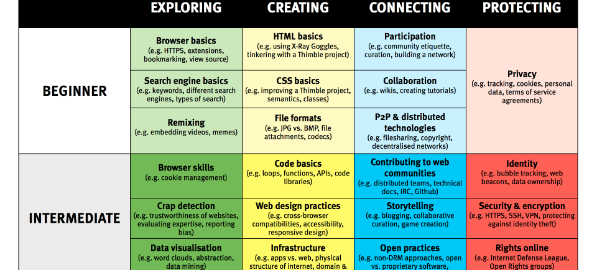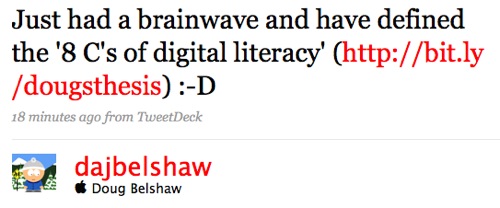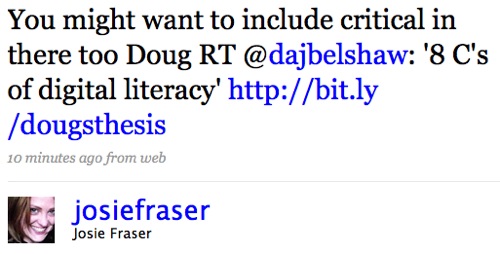At the JISC Conference 2011 I presented with JISC Digital Media on Using Digital Media to Improve Teaching and Learning. For my part of the presentation I used the question of what we mean by ‘attendance’ as a framework:
This was picked up by the editors of JISC Inform and tomorrow I’m being interviewed for an upcoming issue of the online magazine. I’ve been asked the following questions, and below that I’ve written up notes in preparation into some kind of coherent format.
- How do you think student attendance relates to their performance?
- How do you think students measure their engagement/ attendance?
- How do lecturers and other educational professionals measure student attendance?
- How would you define ‘attendance’? Which definition works best?
- What are the issues associated with measuring attendance when students don’t have to be physically present – for example when they are accessing courses online or using mobile learning technology like an educational iphone app?
- How can wise technology use help overcome those issues?
- What needs to change about the way we approach teaching and learning to get over this?
In my presentation at the JISC Conference I pointed out that dictionary definitions of ‘attendance’ can be organised into three main categories. The first is attention-based and involves applying your mind to a thing as well as some form of effort. This is obviously something that we want in learning organizations* and we often call this ‘engagement’.
The second type of attendance centres around the idea of service. This is what many would see as a rather 19th-century idea of subservience: somebody waiting upon the actions or decisions of a superior. I would suggest that learning organizations might want to move away from this kind of definition of ‘attendance’.
Third, and finally, comes the definition of attendance as involving community. That’s to say individuals are present at an event that relies upon interaction around a resource or proceeding. Live concerts, court summons and webinars can all be examples of attendance as community.
If attendance is best conceptualised as attention-based and community-based then what does this mean for learning organizations? Does it mean the death of the lecture? Is it possible to measure these types of attendance in the way that you can with the service-based conception?
A while ago, John Popham got me thinking when he mentioned, almost en passant, that learning organizations coud be using something like Foursquare or Facebook Places for registration. This fits in well with, for example, Jesse Schell’s work on the ‘gameification’ of life that’s happening through Facebook, iPhone/Android apps and social media in general.
Technology, therefore, is a necessary but not a sufficient condition for social changes to take place. For example: there were mobile phones powerful enough to do what the original iPhone did before 2007 but it took the idea of ‘apps’ for the use of smartphones to really take off. In that sense, it’s the culture and social norms around technology that matter rather than the devices and communications technologies themselves.
Increasingly, and especially in a market-driven learning organizations like that being created in the UK, educational institutions are going to be forced to go where they can get the most engagement. Take the London School of Business and Finance, for example, who have recently launched a Facebook MBA Application. As ReadWriteWeb puts it:
When Bill Gates said recently that in the next five years the best education will be found online, I’m not sure he was thinking about Facebook as the educational platform of the future. But the London School of Business and Finance is, and today the school announces a new course that will make its MBA course materials available online for free, delivered via a Facebook app.
Of course, if you want to actually get your MBA, you’ll have to fulfill the pre-requisites for the program (you need the equivalent of a Bachelor’s Degree) and you’ll have to pay for the credits and examinations, offered through the University of Wales. The LSBF MBA will cost you £11,500 for British students and £14,500 for overseas students.
The three areas I’m researching at JISC infoNet** – Open Educational Resources (OERs), mobile learning and digital literacies (the latter also for my doctoral thesis) – are part of wider changes that I think can be understood using the ‘attendance framework’. Constant contact, previously only possible through physical co-location, leads to interaction, and interaction to engagement.
The first thing from my research is that I think we’re seeing a move away from the educator’s right to lecture towards the learner’s right to learn in personalised and tailored ways. This, along with the ability to use OERs within iTunesU, OpenCourseware, etc. for marketing purposes means learning organizations can justify less face-to-face ‘broadcast’ time and more interaction time. There are, nevetheless, proscribed numbers of ‘contact’ hours which, unfortunately only count if face-to-face. That will undoubtedly change and, as with the example of Michael Sandel’s Justice course at Harvard, prospective students will be able to base their decision on which learning organization to attend based on observable teaching and learning experiences.
The second area, mobile learning, is – as I mentioned in these video interviews – a trojan horse for new ways of working and learning. We now take for granted having a device in our pockets that can help us communicate with or broadcast to almost anyone in the world. The opportunities for peer-to-peer learning, as Graham Brown Martin points out in The Napsterfication of Learning, are huge. If post-compulsory learning organizations don’t ensure they have a compelling value proposition, mobile learning could propel them towards a crisis of relevance.
My third area of research is digital literacies, a much-misunderstood topic and one which will soon be the subject of a JISC call for funding. Two of the key things holding back learning organizations from embracing new ways of teaching and learning are the inter-related issues of institutional culture and staff competencies in the digital arena. The two go hand-in-hand: there’s not need for the latter if the former decrees it’s ‘business as usual’. It’s up to those in the senior leadership of learning organizations to convince staff that it’s certainly not ‘business as usual’ and that we’re entering a brave new world where we’re making up the ‘rules’ (if there are any) as we go along.
In conclusion, then, the future isn’t in ‘virtual attendance’ via some kind of Second Life-style ‘avatar as self’. The future of learning institutions is in moving away from service-based definitions of attendance and towards attendance as attention and community. Using that kind of framework or organising schema will help whether there is a business case for continuing existing practices or, indeed, encouraging new ones. Embracing OERs, mobile learning and digital literacies looks to me like the mark of a forward-thinking learning organization.
* I prefer the term ‘learning organizations’ to ‘educational institutions’. Feel free to mentally substitute the latter for the former if you wish.
** A reminder that my research is available at: http://dougbelshaw.com/research




